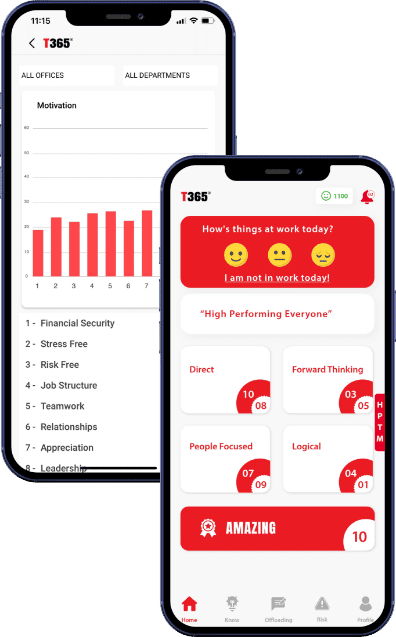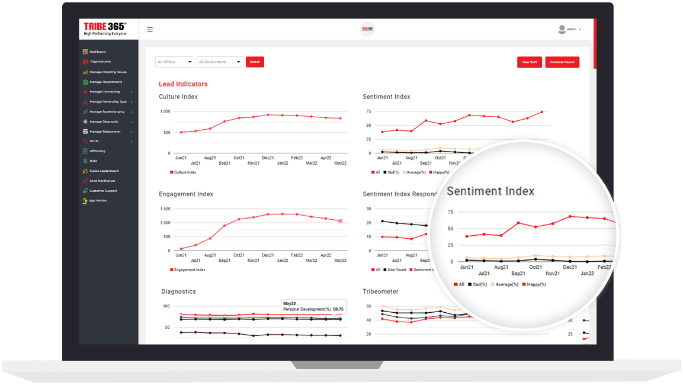How much of “results focus” should be sacrificed in pursuit of “right culture”?
Most businesses will prioritise results above everything as there is the understanding without results there is no business. There is nothing wrong with this argument, it is true, it is undeniable, it is FACT. Without results organisations will fail. People will be made redundant and life will be tough.
There is no escaping the fact we all need results.
Does this mean the current wave of people and culture focus is an unnecessary noise and distraction? Let’s face it we just need results, right?
Well if you are a “Level 1 Leader”, in line with Colin Price’s Paradoxical Thinking, absolutely this may be your limit, focus on results and get through the challenges you have ahead as best you can, there should be no shame in any one of us recognising where we are and where our limitations are.
That being said however, if you are a leader who aspires for more than a level 1 and want to be a level 4 leader who accomplishes paradoxical thinking and believes you can build the best culture and have great people conditions and deliver the best results, then this next part is for you.
So, can we create great culture without sacrificing results?
Absolutely.
There are five areas of focus for getting culture right as leaders, and that is creating environments full of:
- Honesty: Team Members are encouraged to offload the moment things are off
- Balance: Team Members are encouraged to manage their own balance
- Structure: Team Members are encouraged to participate to the structure of all activity
- Passion: Team Members are encouraged to build shared passion in everything they do
- Inclusivity: Team Members are encouraged to build the most inclusive environments
These focus areas can be implemented all at once, not generally advisable as it is a lot of noise, right? Or can be phased in until one by one they are prevalent in everything done within your teams. The order reflects the sequence of focus.
Remember no results focus should ever be sacrificed, so how do we phase in the focus?
Well, let’s start with “Honesty”… Wait a moment!
Create a “Culture and People Statement” so people have an anchor for all culture and people work
From experience even before going down any route to start improving people and culture the first area which needs to be covered is why you are focusing on culture and people at all and what it means to you as an organisation. Do you have a statement of why that is important in addition to the obvious results focus? If not get drafting an organisation “culture and people statement”.
Won’t this disrupt our people? Could it trigger team members to start thinking about themselves more and over focusing on the external noise of people and culture? Of course it could, and probably will.
So what do we do to stop team members over focusing on themselves? Great question, the answer is that you bring everyone back to remember “We are a business, we have achieved many great things to even exist.” right? The people and culture focus is a shift for all of us, but it is not something that we suddenly get battered over the head with. The most important thing is keep delivering results AND starting to focus more on people and culture. Finding the balance between people and results will be tough, but it is a journey we all want to go down and get right, knee jerk over focus will only put everything at threat, we must, for the best of our companies and communities ease into a greater people focused environment, but it can’t be to the detriment of business, right? Otherwise we will have no food on the table!
Maintaining this constant line, that people and culture focus is important but it has to be eased in is essential. It is clear people will take advantage of situations for their own benefit throughout our communities. To avoid this there must be very clear lines. Business and results are essential, and the focus on people is essential. Neither one will be overfocused on to the detriment of the other. Both should be prioritised equally for the best cultures and business results possible, does this all make sense?
Ok, so there is a clear line of importance around culture and people from the business. Now it is time to prioritise honesty.
How do we implement Honesty into our work place?
With honesty it is reinforcing a simple message “Only people in great places will do their best work, so if you’re not in a great place offload (Talk about it)”, right? It is that simple – when we feel great we do great work and if we aren’t in a great place we need to talk about it so things can change – so Balance and Honesty are covered off in a clean swoop. Team Members have to be honest about how they are feeling and the organisation has to want to do things to make things better. Sounds simple enough, right?

Ok, in theory, really easy, but when it comes down to it, months of unpicking historical behaviour, emotion and anomalies. There will be people who have spoken out and were told to get on with things, leaders who will be afraid of all the noise and what responsibilities will be triggered, there will be bullies suppressing noise, and there’ll be all sorts of things. The funny thing is everyone will still want the same thing – the business to thrive, right? That’ll be great for everyone. Again clear narrative and focus is needed and the unbattering commitment to getting everyone to honest spaces is essential. Those worried about the noise generated need to reference that priority number one is maintaining business not overfocusing on people – there will be no business if that happens. Balanced focus, gradual and consistent implementation.
What about Structure?
This area most of us have covered off, right? There is a huge structure within all our organisations and businesses.
The one note I’d suggest is making sure that each activity and element of structure is “Agreed by All”. The essential nature that we all need to agree with the structures and actions we are involved with becomes all too obvious when we don’t agree, right? Just think of anything you have ever been involved with and when you started doubting the process or structure, energy dropped right off or you started feeling conflict, right? This is why it is so important to make sure everyone agrees.
There are loads of opinions out there that would propose getting an agreement by all leads to less effective work and at worst lead to awful results. Anecdotes like “a Camel is a horse designed by committee” exist. I’d suggest this is absurd and only confabulated by weak teams unable to be honest and not value the input of others enough. Let’s quickly explore this – If we all believed in getting out of a burning building. Imagine we work alone, depending on your default team role type you’ll approach differently. Some may step back and look at all options, some may be calling for advice, some may be exploring ideas, some will be running through the nearest exit, and some will be getting the exact details of everything around them unwilling to proceed until there is total clarity. The fact is we all react and look at challenges differently. No one person is right or wrong, and what’s more, each approach has strengths and weaknesses. Together we are most likely to find the best approach, right?
Of course, all of this has to be underpinned by a shared commitment to a shared goal, but this is explored in “Passion”, which is the next area of focus.
How do we set use Shared Vision/Purpose to bring out passion?
Ok, so a lot of us out there have been exposed to shared vision and purpose, right? But then why is this the fourth stage in trying to ease in a culture without disrupting results? Well, a few reasons, the main one is honesty. For the best work to truly stoke passion in every team member, everyone must be able, to be honest. This way the behaviours/values have a chance of being true extensions of team members rather than visible sentiment which is slightly inspiring but ultimately viewed as gimmicky twaddle. The amount of teams I have engaged with and asked about their visions/purpose/mission/values and seen either blank looks or worse disgust is all too common. This needs to stop, too much money is at stake, right? The answer is that if any vision map work is ever being done it has to involve all the team for the best results. It’s that simple. And everyone needs to be able, to be honest. If you have teams who are able, to be honest, balanced and structured the results in defining shared passion are phenomenal.

What role does inclusivity play in strategic growth?
Well, this is my favourite space. I think this is where you start looking outside and saying how do we make sure we maintain all our momentum going forwards? How do we build the best teams? If everything preceding has been done, you’ll have the strongest base to grow from, that is for sure.
However, when it comes to bringing new people in, how do we get that right and why the focus on inclusivity?
If you have a distant relationship with EDI and almost feel it is a noise that really conflicts with results focus, I’d suggest you may need to reassess. As suggested above “Agreed by all” is a strategic position getting maximum results from pre-established teams, and why? Because the more rounded a result we have the better it will be for wider audiences and the challenges of tomorrow, right? Of course, if you sincerely believe your output is perfect and never needs to evolve, then this isn’t for you.
EDI is essential for two parts in strategic growth:
- People being awesome: If individuals come into an environment predisposed to hiding truth because of potential negative sentiment towards them, they are likely to be lesser versions of themselves. To be truly awesome every day we all need to be unshackled of the constraints of not being 100% ourselves. We are all awesome and have huge things to give and contribute to in this world, we must put an end to anyone believing any form of oppression/thought repression or anything that stops anyone from being their natural self is a good thing. Of course, certain behaviours are needed to deliver results, but here’s the thing, if we truly believe in things (Passion) our behaviour follows, and if we think things need to change, we chat!
- Results: As mentioned earlier we all think differently and the more we embrace that and find ways of getting the most laterally diverse ideas happening within teams the greater results for innovation and growth will happen. We only need to look at international government to see most officials come from certain types of backgrounds, right? Great if you want to keep doing things the way they have always been done, but how good for keeping agile communities? I mean even as organisations most of our recruitment happens by prioritising the same things again and again (experience, education above aligned passion).
Why is this the last space to focus on – well for the least disruption really, we need to get the house right before we bring people in, right? We need environments which have already become honest, balanced, structured and passionate before hoping to bring new team members in the right way. What do you think?
Conclusion
Never sacrifice results for getting the right culture! Culture is already in your teams and all that is needed is bringing elements gradually into focus when teams are ready for them. We are all on the people and culture journey, it is unavoidable, but don’t let it become something which embarrasses us into strong actions that disrupt teams. Be gentle and consistent. Business can not be disrupted, we all need food on the table, right? Good luck on the journey. It is added focus, but it isn’t hard. Of course at Tribe365® we have everything pre-mapped out and for £4/team member/month you can have our app implemented and us guiding every team member down the journey to the best culture for your organisation.

Interested in finding out more?
Book a meeting in with the Tribe team
today on +44 (0) 1325734847 or at
team@tribe365.co

















